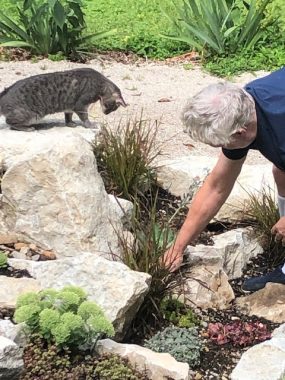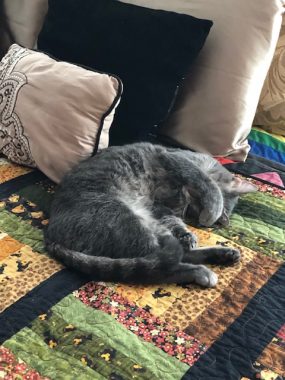How to Manage Parkinson’s Disease: Lessons From My Cat
Written by |

I admit it. We are cat people. Cats are more suitable companions for our lifestyle, particularly given the constraints of Parkinson’s disease (PD). Petie is my familiar, and Squeaker is Mrs. Dr. C’s snuggle pal. Relationships with cats are special, especially for anyone with a chronic illness like Parkinson’s.
Petie allows me to be in a relationship with him. This is the first lesson. He was a bit reticent in the first year. We got Petie and Squeaker at the same time. Their former owner had died, and the adoption agency wanted to keep them together in a new home. While neither Petie nor Squeaker exhibited signs of abuse, Petie was the more cautious member of the cat team.
The lesson is that entering a cat’s space takes considerable empathy and patience from both cat and human. Cats will allow humans in when they are ready, and not before. One must be in tune with the cat and the moment. In return, there is unconditional love, loud purring, a flickering of the tail, and a gentle head-butt against my leg.
The second lesson is that cats are creatures of habit. One habit involves eating at the same time every day. Both Petie and Squeaker have become more vocal in bringing empty food bowls to our attention. Early morning, midmorning, early afternoon, late afternoon, and sometimes late-night kibble treats have become routine. Petie’s meals are more like snacks. I, too, find that snacking through the day is preferable to a full-blown, heavy meal when self-managing Parkinson’s digestive issues.
As the Shake It Up Australian Foundation notes, “Research shows that regular exercise helps many people with Parkinson’s disease improve symptoms. Running around with a cat also qualifies as exercise (though of course cats are better known as naptime companions!).”
Petie and I share our most productive four hours during the day. We try to make the most of every minute. Petie’s exercise routine is property perimeter check, population tally of the birds at various feeders, observation of flying bugs, and a quick assessment of the gardens for voles or mice.
He gladly accompanies me if it’s cool enough for me to work outside. Often, he assumes his perch on a stone wall near my working area, all the better to monitor my efforts.

Petie and Dr. C in summer 2021. (Photo by Mrs. Dr. C)
I find that I can perform activities for up to four hours.
The American Parkinson Disease Association has shared the following:
“[H]igh intensity interval training (HIIT) is a form of exercise in which a person performs short periods of extremely demanding physical activity alternating with less intense exercise … with studies showing that it may offer health benefits over exercise performed at a more constant demand level. There have been small studies that this type of regimen has benefits in PD as well.”
Gardening allows me the opportunity to alternate strenuous activity, such as shoveling and hauling gravel, with less strenuous work, like raking. A couple hours in the morning for exercise, and then rest. Another hour in the afternoon, then rest. Petie and I strongly recommend the resting part of the schedule.
Petie is also my teacher for lesson three. Perfectly predictable, without fail, he greets each day with enthusiasm and bounding excitement. He doesn’t sulk in the corner, looking miserable. He isn’t concerned about whether he has any aches or pains or restrictions on moving about. He is simply happy to explore the day.
Lesson four is being available to relax. After running about chasing the errant squirrel population or stalking birds, Petie likes another snack and then a nap. But he doesn’t nap until he’s had his morning full-body massage.
The massage gives him the reassurance that everything is all right. His human is close by. The massage relaxes any pent-up energy. Cats are masters of stress reduction, and I find that my symptoms are more manageable if I can emulate Petie’s quiet space.
The most important lesson I’ve learned from Petie is, “When it’s time to sleep, nothing else matters.” Cats have the admirable ability to fall asleep anywhere, at any time, and in any position.

Petie sleeping in summer 2022. (Photo by Mrs. Dr. C)
Restful sleep has become elusive to me most nights. I can’t adhere to a normal sleep schedule of eight hours a night. I’m following Petie’s advice — sleep whenever the body wants to, and in the most comfortable location.
The rewards of a cat-familiar relationship are a healing partnership and good lessons on how to live with Parkinson’s. But not everything is a life lesson; both Petie and I find that there’s always time to chase a butterfly.
Note: Parkinson’s News Today is strictly a news and information website about the disease. It does not provide medical advice, diagnosis, or treatment. This content is not intended to be a substitute for professional medical advice, diagnosis, or treatment. Always seek the advice of your physician or another qualified health provider with any questions you may have regarding a medical condition. Never disregard professional medical advice or delay in seeking it because of something you have read on this website. The opinions expressed in this column are not those of Parkinson’s News Today or its parent company, Bionews, and are intended to spark discussion about issues pertaining to Parkinson’s disease.




Gil Thelen
I am reading your fascinating book "Possibilities with Parkinson's." Soporific title but mind-bending content. I plan to write several blogs on it on www.shufflingeditor.com. I am a retired newspaper editor in Macon, GA, President of www.meoverpd.org and author of "Counterpunch: Duking It Out With Parkinson's." you are doing groundbreaking work.
Dr. C.
Hi Gil ~ High praise indeed from a fellow writer and editor. I will check out your blog. Hope that you can check in with the next column. I think you'll find it exciting. Many, many thanks for following Dr. C. and I really will look forward to reading your blogs.
Dr. C.
Mike
Dr.C,
My wife and I have 2 cats. Tom and Geri both are rescue animals that have been wonderful companions. My wife picked up Geri in Sun City when I was being diagnosed finally with Parkinson’s. She has been underfoot for the last 2 years. Needless to say she helps me to pick up my feet when I walk. Geri also helps me with the improvised boxing routine I do in the morning. Tom has shown me how to relax and sleep on a fairly regular regular schedule. I use Melatonin which Tom does not seem to need. Both have light attitudes
regardless of the situation. C thanks for sharing your feline Friendships, Blessings, Mike